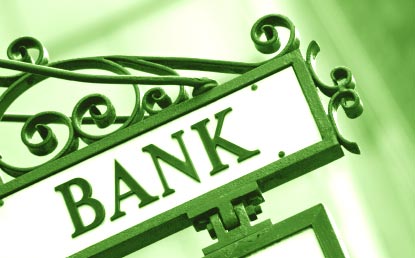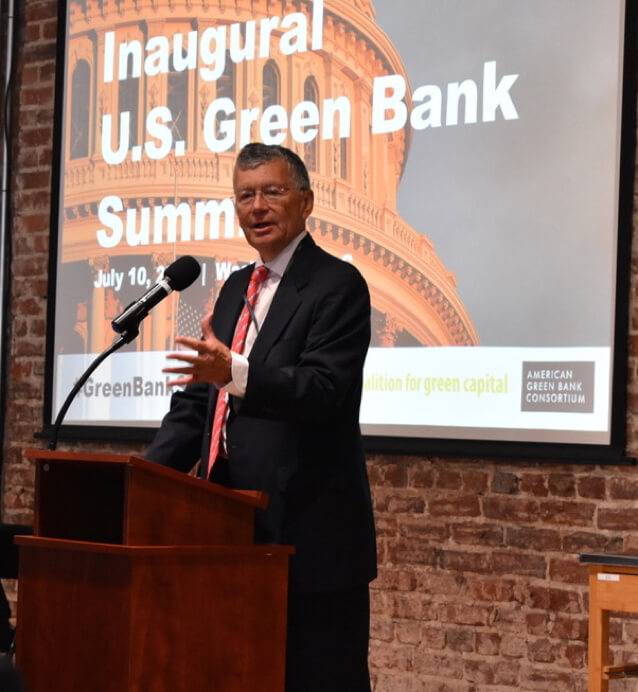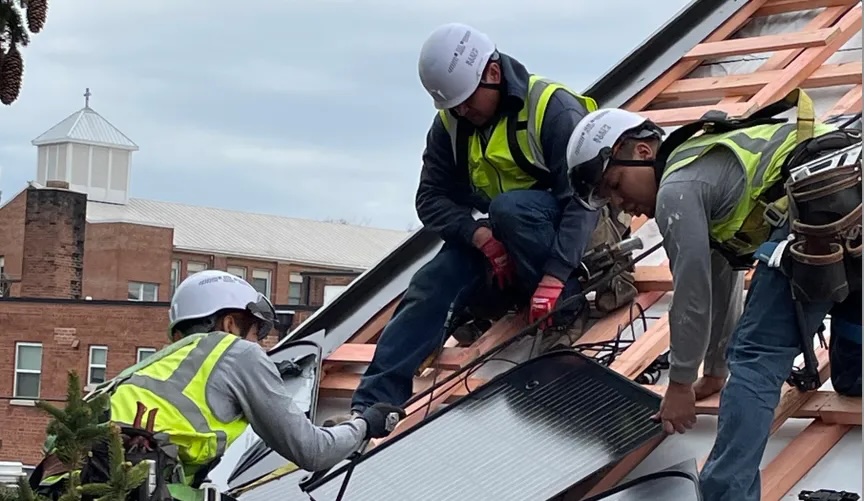Reed Hundt’s Coalition For Green Capital Wins Major Victory
Editor’s Note: Proving once again the value of persistence, Reed Hundt’s Coalition for Green Capital won a major commitment from the federal government. This effort started in 2009, when Reed tried to get green bank financial support enacted into law. Finally, in 2022, the Inflation Reduction Act set aside $27 billion for public-private investments in rooftop solar installations, energy efficiency upgrades and other projects that help reduce greenhouse gas emissions. The $27b will be leveraged by private investors to over $150b in loans for such purposes. It’s a major win — and could be a model to mobilize the huge amounts of capital necessary to fund the transition to clean energy.
from: Inside Climate News
White House Awards $20 Billion to Nation’s First ‘Green Bank’ Network
At least 70 percent of the funds will go to disadvantaged communities, the administration said, while 20 percent will go to rural communities and more than 5 percent will go to tribal communities.
By Kristoffer Tigue | April 4, 2024
The Biden administration on Thursday announced it was creating the nation’s first “green bank” network, an historic $20 billion investment aimed at making clean energy affordable to low-income and rural residents.
The banks will provide low- or zero-interest loans “to fund tens of thousands of climate and clean energy projects across America, especially in communities historically left behind and overburdened by pollution,” the White House said.
It’s President Joe Biden’s latest effort to uphold two of his key campaign promises ahead of the November election: slowing climate change and advancing environmental justice.
 Under the Environmental Protection Agency’s Greenhouse Gas Reduction Fund—also known as the country’s first national green bank—eight community development banks and nonprofit organizations will receive that federal funding to go toward rooftop solar installations, energy efficiency upgrades and other projects that help reduce greenhouse gas emissions. The Inflation Reduction Act created the green bank in 2022 with an initial federal investment of $27 billion.
Under the Environmental Protection Agency’s Greenhouse Gas Reduction Fund—also known as the country’s first national green bank—eight community development banks and nonprofit organizations will receive that federal funding to go toward rooftop solar installations, energy efficiency upgrades and other projects that help reduce greenhouse gas emissions. The Inflation Reduction Act created the green bank in 2022 with an initial federal investment of $27 billion.
Vice President Kamala Harris traveled to North Carolina Thursday to publicize the announcement, appearing with EPA Administrator Michael Regan and North Carolina Gov. Roy Cooper at a press conference in Charlotte, where they named the eight recipients. The groups, which consist of Coalition for Green Capital, Power Forward Communities, Appalachian Community Capital, Climate United, Justice Climate Fund, Opportunity Finance Network, Inclusiv and Native CDFI Network, have committed to spend $7 in private investment for every $1 of government funding.
The White House said that the new initiative will generate about $150 billion in clean energy and climate investments and help the nation avoid the release of 40 million metric tons of carbon pollution each year through 2031. At least 70 percent of those funds will go to low-income and disadvantaged communities, the administration said, while 20 percent will go to rural communities and more than 5 percent will go to tribal communities.
 “The majority of this $20 billion will go to communities that have historically been left out and left behind,” Harris said at the Charlotte event. “For the first time in history, we are providing tens of billions of dollars directly to community lenders to finance local climate projects.”
“The majority of this $20 billion will go to communities that have historically been left out and left behind,” Harris said at the Charlotte event. “For the first time in history, we are providing tens of billions of dollars directly to community lenders to finance local climate projects.”
“Imagine a small business owner who can now take out a line of credit to buy a fleet of electric delivery vehicles, so he can stop paying for gas and reduce pollution at the same time,” she added. “Imagine a house of worship that can now get a zero-interest loan, so they can install solar panels to generate clean energy electricity for the entire neighborhood.”
Climate advocates largely celebrated the news, calling the move historic and saying it would jumpstart clean energy investments across the country. The Coalition for Green Capital, which received $5 billion, said it’s looking forward to collaborating with hundreds of community organizations and commercial partners on their projects.
To date, the coalition and its partners have helped secure more than $9 billion in public and private capital for clean energy projects in multiple states, including California, Colorado and New York. Some of the projects funded by the coalitions’ partners include the installation of solar and battery storage systems at two recreation centers in Detroit, which reduced the facilities’ energy bills by 35 percent, and helping Black churches in Georgia connect to clean-powered microgrids.
 “The EPA’s awards of $20 billion compose the largest single capitalization of green banks in any country in the world,” Reed Hundt, Coalition for Green Capital’s CEO and co-founder, said in a press release. “The United States now can lead all nations in showing how public-private investment can deliver cheap clean power faster than anyone has predicted.”
“The EPA’s awards of $20 billion compose the largest single capitalization of green banks in any country in the world,” Reed Hundt, Coalition for Green Capital’s CEO and co-founder, said in a press release. “The United States now can lead all nations in showing how public-private investment can deliver cheap clean power faster than anyone has predicted.”
But the announcement also comes as Biden faces historically low approval ratings just months before the November election. Biden’s approval rating Thursday sat at just 39.2 percent, according to ongoing polling by FiveThirtyEight, a remarkably low rating for any sitting president.
Biden has by far done the most of any president to advance climate policy. The Inflation Reduction Act, which Biden signed into law in 2022, dedicates around $370 billion to climate efforts. But some political analysts say the president has damaged his climate image after greenlighting a major expansion of U.S. fossil fuel exports in recent years, which progressives believe goes against the president’s promise to fight climate change. Some young climate activists are also criticizing Biden’s handling of Israel’s war in Gaza, calling on the president to demand a permanent ceasefire or risk losing their votes.

